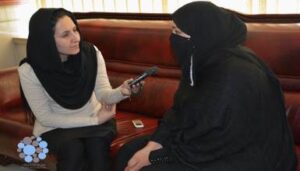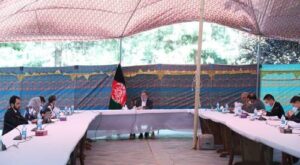
MONITORING (SW) – The Amnesty International has expressed grim concerns over the fate of over 4 million internally displaced persons amid second wave of the coronavirus pandemic in Afghanistan.
In an in-depth article, the humanitarian watchdog said the world is facing the largest humanitarian crisis this year. The Global Humanitarian Review 2020 states that around 168 million people are in need of humanitarian assistance. While humanitarian workers carry a heavy burden, millions of people in need face a daily struggle to survive, to support their families. Among them are the victims of Afghanistan’s enduring conflict, which has forcibly displaced people for more than four decades and continues to claim thousands of civilian lives each year.
Amnesty International said despite the introduction of a new IDP Policy in 2013, little has changed for them. And now, amid a pandemic, many of the problems they face have been exacerbated.
Below are some of their stories that Amnesty International collected on a recent visit to IDP camps in Afghanistan by speaking to women and men who are struggling with many issues. These stories need to be heard.
Overcrowded camps
Hakim* was displaced from Laghman province and has been living in Chaman-e Babrak camp located in urban Kabul for the past 18 years. The lockdown has been particularly hard, with no food available in the camp, with limited access to employment the IPDs had completely closed. Hakim said that the government provided them with food for the first two weeks, but it was discontinued after that.
Hakim believes that it is impossible to protect themselves from COVID-19 due to the dire living conditions in the camp. He is aware of the precautions they are supposed to take as preventive measures – the local media and mobile teams of doctors have been informing them.
“How can we keep social distancing if all 8 people are living in one room which is made of mud, pole and plastic sheets with a very small light and no ventilation? How can we wash our hands for 20 seconds if we can’t find water to drink and have to buy 25 litres of water for 15 Afghani each (USD 0.20)? How can we quarantine someone with the signs of coronavirus if we only have one room? How can we get tested if we do not have the money to travel to the hospitals where they would perform a free coronavirus test?”
Access to water
Mariam* has been living in Surkh Diwar IDPs settlement in Nangarhar for about a year and half. Lack of access to water has been an issue in the past as well, but COVID-19 has brought in a new layer of urgency and demand for water and keeping hygienic which cannot be met.
“We have not had water during the pandemic, and we had to travel long distances to get water from people’s houses or buy it from the tankers. It was extremely difficult to keep clean and manage hygiene when there is no water, when people are unemployed, and a pandemic is raging. Most women had problem accessing clean water or hygiene but for women and girls with disabilities, it was even worse.”
As Mariam pointed out, women, girls, children, and people with disabilities face additional layers of suffering – whose specific rights are forgotten in even the best of times.
Awareness-raising
Aisha* from Surkh Diwar IDPs settlement in Nangarhar Province worries about the pandemic and unlike in the camp in Kabul, she wishes there was more information available at the camp for her to understand the situation better.
“I don’t know what coronavirus is, I only heard from other people within the settlement who said that there is an outbreak of a disease called coronavirus in Afghanistan which looks like you are catching cold and it could kill people. Other than this we have not received any information, and no one came to explain it to us.”
She fears that some people in the settlement are already affected by COVID-19, but no one has been tested to confirm. Aisha doesn’t know which medical center or hospital in the area would provide the test. Their safety precaution when/if they notice that they have the symptoms, is to lock themselves in the house – with the rest of their family members because there isn’t enough space for one person to quarantine while maintaining a safe distance from others in the family.
The usual practice at the camp when someone is unwell is to wait till you are seriously ill to go to the hospital. The public hospital would provide facilities for free but Aisha and others in the camp can hardly afford to pay for transport to go to the hospital in the city. Lockdown during the pandemic has stopped the little earnings they used to make as most of them are engaged in informal, part-time work, often in manual labour as a porter at a local market or assisting with construction work. “Now it’s all in God’s hand – who recovers and who dies.”
Unemployment
Abdul* a man in his 60s is nostalgic about the life he led before displacement six months ago. Before the armed conflict between the Islamic State and Afghan Government forces affect his village, he used to be a shopkeeper in his village. Displacement made him a laborer, the pandemic made him unemployed.
“We are living with nothing honestly, we don’t have work, we don’t have money and we don’t have anywhere to live. Only God knows how difficult our situation is.”
Abdul and others in his camp have not received any assistance since the lockdown as all economic ventures have halted. His last resort had been to borrow goods and food from shops and a bakery nearby to feed his family and that has been going on for four months. He says he is about 45000 Afghani (USD 600) in debt now with no idea of how to pay back.
Impact of COVID19 on Women and Children
Malik* a 70-year-old man from Nangarhar Province, has seen the worst in the camps. That was before the pandemic. Women are put through a lot of pressure during the pandemic and suffer from psychological trauma, especially due to added layers of pressure and violence they face.
The pandemic has made unemployed men, who had been already under a lot of pressure, stay at home and that led to increased cases of domestic violence and violence against women.
“I am not saying that because we are poor, we are evil, but that the economic condition is impacting both men and women in different ways.
We did not receive any form of assistance from aid agencies. Our children have diarrhoea and suffer from malnutrition and if we do not receive assistance for this, they will die.”
Malik, like millions of others in IDP camps, is helpless in the face of their plight characterized now by poverty and the pandemic.
ENDS





